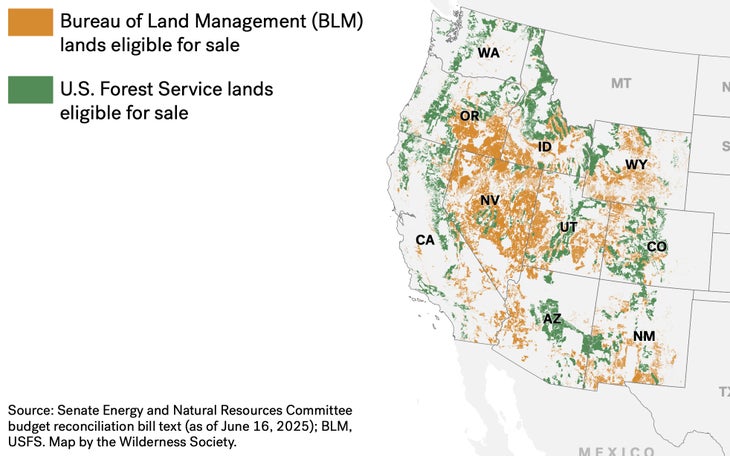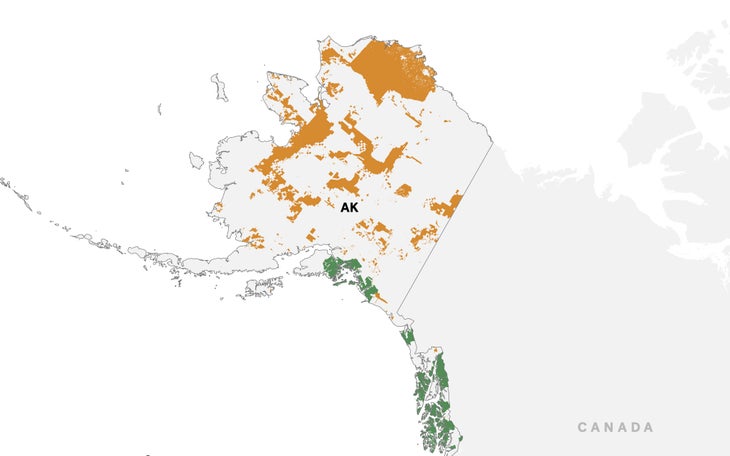There’s a new plan in Washington D.C. to auction off public lands, and this one involves millions of acres spread across nearly a dozen Western states.
The latest stipulation would require the U.S. Forest Service and Bureau of Land Management (BLM) to sell off roughly 3 million acres by 2030.
On Tuesday, June 10, this plan was added to the draft legislation of President Donald Trump’s tax and spending megabill by the Energy and Natural Resources Committee in the U.S. Senate.
This sprawling piece of legislation, called “One Big, Beautiful Bill Act,” passed the House of Representatives in early June, and is currently under debate in the Senate.
Sources told The New York Times that two Republican lawmakers—Mike Lee of Utah and Steve Daines of Montana—worked closely to decide on the plan.
Previous plans to sell off public lands have been met with public outcry. An earlier version of the Big, Beautiful Bill Act included a smaller selloff proposal, suggesting the liquidation of nearly 500,000 acres of public land in Nevada and Utah.
This provision was axed before the bill passed the House of Representatives, after backlash from the House’s Public Lands Caucus, a bipartisan group led by New Mexico Democrat Gabe Vasquez and Montana Republican and former interior secretary Ryan Zinke. Zinke called the measure his “San Juan Hill.” He has previously told �����ԹϺ���: “The idea that you’re going to sell public land to get out of debt is folly.”
This latest—and substantially larger—land sale proposal was announced by Lee, who is the chairman of the Senate Energy and Natural Resources Committee. Specifically, the reconciliation bill’s language dictates that “not less than 0.50 percent and not more than 0.75 percent” of all BLM land be sold to the private sector, as determined by the Secretary of the Interior. Identical language and percentages dictate the sale of National Forest land as determined by the Secretary of Agriculture.


The BLM manages 245 million total acres, and the the Forest Service manages 193 million acres. Under the plan’s rules, up to 3.29 million acres of public lands would be placed on the auctioning block.
Lawmakers have said the sale of public lands would raise funds for the federal government and clear land for housing development. The plan would put public lands in 11 states: Alaska, Arizona, California, Colorado, Idaho, Nevada, New Mexico, Oregon, Utah, Washington, and Wyoming.
Zinke’s state, Montana, is the only Western state excluded from this updated proposal.
The that national parks, national monuments, and designated wilderness areas would be exempt from auction, and land near existing population centers would be prioritized. The bill also mandates that any public land sales must occur solely for “for the development of housing or to address associated community needs,” but it leaves the definition of these “associated community needs” up to the Secretaries concerned.
“Senate Republicans have finally said the quiet part out loud,” said , the ranking Democrat on the Energy and Natural Resources Committee. “They want to put millions of acres of our public lands up in a fire sale, destroy the investments that have created thousands of manufacturing and clean energy jobs – including in their home states, and obliterate programs that lower energy costs for everyday Americans.”
The plan received immediate criticism from nonprofit groups and organizations that work in conservation and outdoor recreation.
“What some may see as a barren lot on a map on a Senator’s desk may actually be where a community hikes after work, rides their ATV, or teaches their kids how to hunt turkey or ride a bike,” reads a statement from Outdoor Recreation Roundtable, a lobbying group for the outdoor recreation industry. “And once these treasured places are sold to private industry, they are gone forever, and in the case of this proposal, can be used for any purpose after ten years.”
David Willms, associate vice president for public lands at the National Wildlife Federation, called the plan “orders of magnitude worse than what the House proposed last month.”
“Mandating the fire sale of up to two-and-a-half million acres of public land violates more than a century of land stewardship, threatens wildlife and clean water, runs directly against widespread public opinion, and will not begin to solve either the budget crisis or the affordable housing crisis,” he said.


